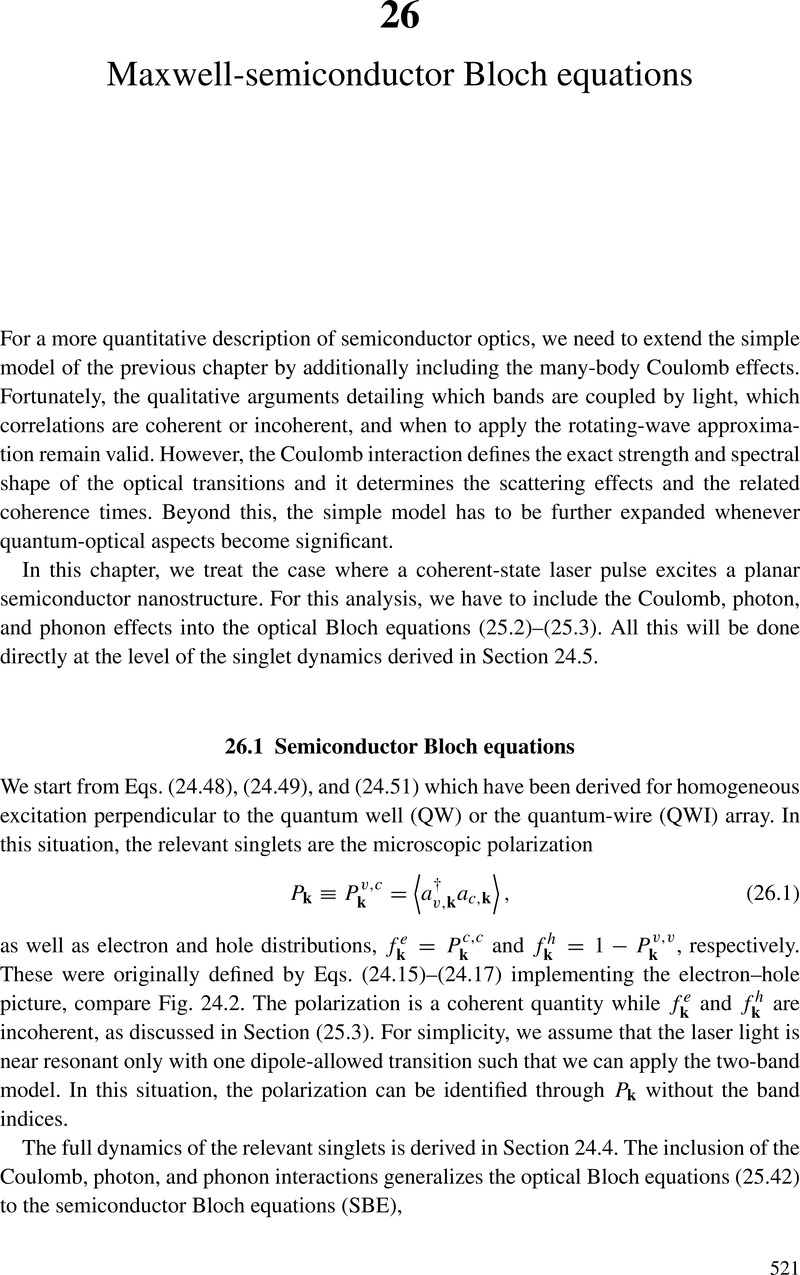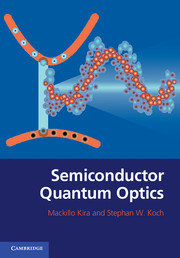Book contents
- Frontmatter
- Contents
- Preface
- 1 Central concepts in classical mechanics
- 2 Central concepts in classical electromagnetism
- 3 Central concepts in quantum mechanics
- 4 Central concepts in stationary quantum theory
- 5 Central concepts in measurement theory
- 6 Wigner's phase-space representation
- 7 Hamiltonian formulation of classical electrodynamics
- 8 System Hamiltonian of classical electrodynamics
- 9 System Hamiltonian in the generalized Coulomb gauge
- 10 Quantization of light and matter
- 11 Quasiparticles in semiconductors
- 12 Band structure of solids
- 13 Interactions in semiconductors
- 14 Generic quantum dynamics
- 15 Cluster-expansion representation of the quantum dynamics
- 16 Simple many-body systems
- 17 Hierarchy problem for dipole systems
- 18 Two-level approximation for optical transitions
- 19 Self-consistent extension of the two-level approach
- 20 Dissipative extension of the two-level approach
- 21 Quantum-optical extension of the two-level approach
- 22 Quantum dynamics of two-level system
- 23 Spectroscopy and quantum-optical correlations
- 24 General aspects of semiconductor optics
- 25 Introductory semiconductor optics
- 26 Maxwell-semiconductor Bloch equations
- 27 Coherent vs. incoherent excitons
- 28 Semiconductor luminescence equations
- 29 Many-body aspects of excitonic luminescence
- 30 Advanced semiconductor quantum optics
- Appendix Conservation laws for the transfer matrix
- Index
- References
26 - Maxwell-semiconductor Bloch equations
Published online by Cambridge University Press: 05 January 2012
- Frontmatter
- Contents
- Preface
- 1 Central concepts in classical mechanics
- 2 Central concepts in classical electromagnetism
- 3 Central concepts in quantum mechanics
- 4 Central concepts in stationary quantum theory
- 5 Central concepts in measurement theory
- 6 Wigner's phase-space representation
- 7 Hamiltonian formulation of classical electrodynamics
- 8 System Hamiltonian of classical electrodynamics
- 9 System Hamiltonian in the generalized Coulomb gauge
- 10 Quantization of light and matter
- 11 Quasiparticles in semiconductors
- 12 Band structure of solids
- 13 Interactions in semiconductors
- 14 Generic quantum dynamics
- 15 Cluster-expansion representation of the quantum dynamics
- 16 Simple many-body systems
- 17 Hierarchy problem for dipole systems
- 18 Two-level approximation for optical transitions
- 19 Self-consistent extension of the two-level approach
- 20 Dissipative extension of the two-level approach
- 21 Quantum-optical extension of the two-level approach
- 22 Quantum dynamics of two-level system
- 23 Spectroscopy and quantum-optical correlations
- 24 General aspects of semiconductor optics
- 25 Introductory semiconductor optics
- 26 Maxwell-semiconductor Bloch equations
- 27 Coherent vs. incoherent excitons
- 28 Semiconductor luminescence equations
- 29 Many-body aspects of excitonic luminescence
- 30 Advanced semiconductor quantum optics
- Appendix Conservation laws for the transfer matrix
- Index
- References
Summary

- Type
- Chapter
- Information
- Semiconductor Quantum Optics , pp. 521 - 549Publisher: Cambridge University PressPrint publication year: 2011
References
- 1
- Cited by



